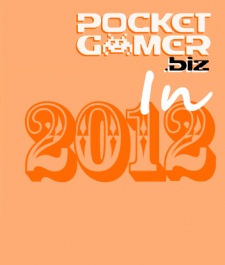That's because they symbolised the big trends that ensure the mobile part of the gaming industry is the tail that's wagging the whole dog, as well as highlighting the companies who are making - or losing - the big bucks.
Of course, we're not saying these are the best games of the 2012. Some of them shouldn't have been made, but all are significant in their own way.
Read on....

10. Curiosity -- What's Inside the Cube?, 22cans
Since the App Store was launched, we've seen dozens of experienced game companies dash themselves on the rocks of mobile gaming. Peter Molyneux's start up 22cans is the latest example.
The reason isn't its debut iOS/Android 'game' Curiosity -- What's Inside the Cube? isn't an interesting concept. Actually, it isn't an interesting concept...
It's more like a pub thought experiment that got out of hand. Fine. That's the sort of thing Peter Molyneux does very well, and he brings the audience along with him, at least for a period of time.
No, the reason Curiosity is significant is its entire twisting lifecycle: from the typically Molyneux-esque build up; through the name confusion; failure to launch on time; failure to launch successfully; minute-by-minute detail of the crunch to launch successfully; followed by the removal of layer upon layer of the cube without any hint of a reveal - only to end with Curiosity's re-valuation as 22can's launchpad for its Kickstarter campaign (now successful) for Godus.
Believe me, this is no personal criticism. I've tapped my layer pixels and paid my Kickstarter dues, although I do worry about Curiosity's longterm impact on PocketGamer's diarist Harry Slater.
More significantly, however, this is a project that launched with plenty of warm words, but without any monetisation and despite its experienced team, any understanding of the server infrastructure required. On that basis, it's been a complete disaster and one that demonstrates how important it now is to have experience of operating a mobile game if you want to be successful in this space.
And despite winning Apple's iPhone Game of the Year award with Rayman Jungle Run (a lovely game, but not a true mobile game), I'd suggest Ubisoft has similar - if different - lessons to learn.
Anyone can get acclaim or column inches these days. You want respect? Show me the money.
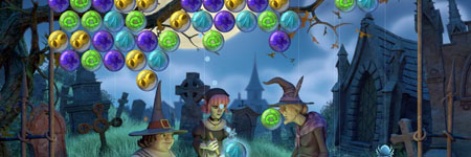
9. Bubble Witch Saga, King.com
Is Bubble Witch Saga a good game? No.
It's a common-or-garden bubble popper - the Bubble Witch part - that's been made highly successful thanks to its accessibility through the free-to-play business model, strong social connectivity thanks to the rise of Facebook, and an asynchronous level structure - the Saga part.
Why it's significant as a mobile game in 2012 is it's the perfect example of a cross-platform game; that is one that can be played on iOS, Android or Facebook with the game state saved no matter on which platform you play.
In that sense Bubble Witch Saga is an exemplar of what all web/Facebook game developers will be looking to do as they attack mobile in 2013.
It won't win them the war, but it's a feature players already expect, and one that could be an obstacle to companies like Kabam, Kixeye and 5th Planet who are already operating big web/Facebook games that can't be so easily synced as they launch on mobile, due to reasons of their competitive gameplay and/or existing audience.
Interestingly, Bubble Witch Saga hasn't been particularly successful on iOS and Android, given its Facebook popularity, but with the technology in place, King.com has already applied the same formulae to its sugary match-3 game Candy Crush Saga, and will continue to do so with every future launch.
It's a strategy that looks to a final victory not by blitzkrieg, but by constriction.
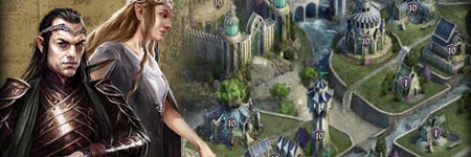
8. The Hobbit: Kingdoms of Middle-earth, Kabam
Can you remember back to the bad old days when Riot-E paid a reported $1 million for The Lord of the Rings licence for SMS and WAP games?
The Finnish mobile developer raised 20 million and went bust within two years. At least it lived up to its slogan "We don't make games, we create riots".
So there was a sense of deja vu in November, when US web/mobile publisher Kabam announced it had signed a deal to make games based on The Hobbit film licence.
It quickly released The Hobbit: Kingdoms of Middle-earth on iOS, Android and online - something which was equally quickly declaimed by players as being nothing less than poor reskin of its existing city-building PVP games.
This critical rejection was particularly interesting given the mobile version of Kingdom of Camelot, one of Kabam's big city-building PVP web games, was the top grossing iPhone game in the US during 2012.
But it seems games companies will never learn that buying a movie licence to make a quick buck is the fastest way to lose credibility. Have people already forgotten GoldenEye on the N64 came out two years after the James Bond film of the same name?
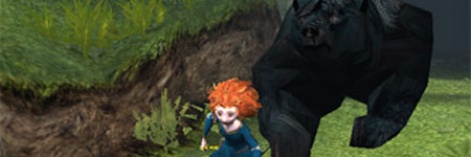
7. Temple Run: Brave, Disney
We're unsure whether its Lucasfilm acquisition will eventually drag the entire company into a black hole in a galaxy far, far away, but during 2012 at least, Disney Mobile demonstrated uncanny wisdom.
It flipped its already successful Where's My Water? game with the successful Where's My Perry?, also releasing a reasonable game based on its film that was based on games Wreck-It Ralph.
And while we were also convinced by the Mega Run reskin in the shape of Monsters Inc Run, it was another reverse licensing deal that really caught our attention.
For reasons no one apparently knows, Imangi's Temple Run was one of the games of 2011, and redeveloped as a sort of sequel for the Disney movie Brave, Temple Run: Brave was even better than the original. And Disney charged 99c for it.
Whatever Bart Decrem and co are stealing from the House of Mouse's wine cellar, it's potent stuff.
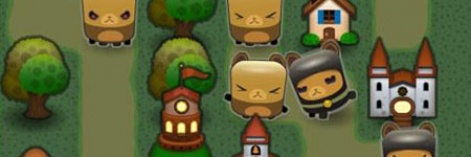
6. Triple Town, Spry Fox
I love Triple Town, which finally came to mobile in January 2012.
I'm a terrible player, but it does something new with the often tedious match-3 mechanic, while the odd frontier vibe of turning bushes into trees, bears into churches via tombstones etc etc catches the attention. It's just a nice, and different, experience.
Other developers also noticed and given it was first released for Kindle in 2010 and Facebook in 2011, they've had plenty of time to due so. Still the lawsuit between developer Spry Fox and publisher 6waves Lolapps (as was at the time), by way of Escalation's copycat game Yeti Town demonstrated that even tiny studios will fight back.
Of course, coming on the back of Zynga's 'appropriation' of NimbleBit's Tiny Tower for its Dream Heights, and many other clonings - Temple Run went through a weekly cycle of being copying - it cast the whole inspired by/influenced by situation into sharp relief.
Spry Fox's determination to defend its rights - coupled with what appeared to be serious internal issues within the 6waves Lolapps executive team - saw it gained an out-of-court victory, while 6waves Lolapps effectively was forced to rebrand itself and refocus its business model.
Whether it will stop further overt copycatting, it's hard to judge. But at least in this case, the innovators appear to have been victorious.
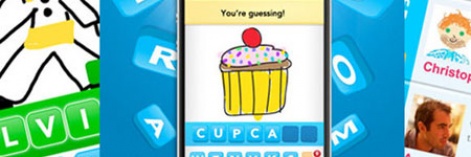
5. Draw Something, OMGPOP (Zynga)
Coming on the back of Zynga's With Friends series of games, Draw Something can't be viewed as an original game concept.
But it was a game that slowly on Facebook, and very quickly on iOS grabbed minutes and then hours from millions of players on a daily basis. And on that basis, Zynga spent $180 million acquiring developer OMGPOP, which had no other assets.
In that context, Draw Something was the most lucrative game of 2012.
Of course, hindsight is a wonderful thing and according to Zynga's accountants, the company paid between $85 million and $95 million too much. At least, that's the goodwill it's already written off.
Still, as I argued at the time, such valuations are very hard to judge. I thought it was a reasonable deal given Zynga's strong cash position, while some much better qualified people though OMGPOP had sold too early, 'leaving as much as $800 million on the table'. We could be wrong.
If nothing else, though, Draw Something acts as warning that very social free-to-play games can bloom and fade very quickly. In other words (and pictures), beware the fad.
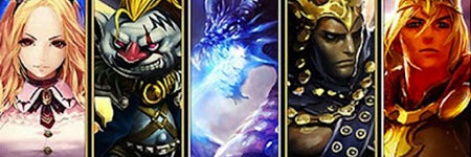
4. Rage of Bahamut, Cygames/DeNA
While trying to distance myself from 'grandad dancing at your wedding' jibes, 2012 has marked my continued failure to understand card-battling games.
As far as I can see, they're all monetisation and no skill. I thought the Japanese government had banned that sort of thing? Apparently not. Card-battlers are all the rage with certain niches of young men and that's where Rage of Bahamut has found its market.
It's been downloaded millions of times on iOS and Android and generated millions of dollars, but unlike some of the game in this list, it remains a niche game; one that a relative small number of players spend disproportionally to play.
You don't need to go big to monetise big, in other words.
And as well as being the poster child for the genre, it's also important as providing Japanese social mobile gaming platform DeNA with its first international hit. And given that its arch rival GREE didn't find similar success in 2012 that makes Rage of Bahamut even more significant.

3. The Simpsons: Tapped Out, EA
Given that the cool kids had left Homer behind, moving onto Futurama, Family Guy, America Dad, before getting old and having kids of their own, the success of The Simpsons: Tapped Out is nothing short of amazing.
Particularly given how badly EA snafu-ed the original launch for its Springfield-located mobile free-to-play game.
Launched in March, the game reviewed badly, and not just for the technical server problems that EA cited when it pulled the title. Indeed, given that it didn't return to the App Store until August, it's fair to say that time wasn't just spent on calling Amazon support to get some more cloud capacity.
Nevertheless, since its late summer resurrection, Tapped Out has sat firmly in the top grossing charts demonstrating the incredible power of media brands - just as Capcom found in 2011 with Smurfs' Village.
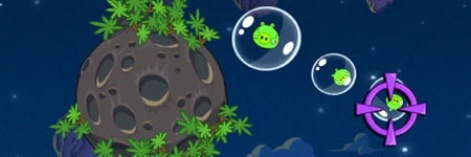
2. Angry Birds Space, Rovio
Compared to previous years, 2012 has been nothing short of hyper-active for Rovio. And more importantly, it's been a year that's seen the company spread its wings in terms of the games it's released.
Amazing Alex was a solid remake, while Bad Piggies was built on a similar user-generation content push, although neither game could be ranked alongside the Angry Birds franchise in terms of financial performance.
Perhaps Angry Birds Star Wars was the biggest surprise from Rovio, but weighed down by the baggage of a sagging IP, the release was solid rather than spectacular.
Instead, it was Angry Birds Space that impressed. Okay, Rovio still has yet to go truly free-to-play but Angry Birds Space took the much loved and well-understood gameplay and did something that was sufficiently different to engage its mass market audience in a new manner.
And that's what you should expect from great sequels.

1. Hay Day, Supercell
I bet the two games that feature in other mobile websites' top games of 2012 list are Clash of Clans and CSR Racing.
I've played both extensively, and commercially both have clearly performed far beyond their developers' expectations, but in neither case should this be a surprise. NaturalMotion has already proved its high quality 3D graphical focus with My Horse, while Clash of Clans' similar concept has been merely accelerated by riding the city-building PVP gameplay: without doubt the hottest genre of 2012.
And that's why Hay Day is a much more significant game. Instead of riding the surprise of the new, it's reinvigorated the success of the old.
While Zynga's focus slipped from the likes of FarmVille to mid-core and casino games, companies such as TinyCo and Pocket Gems struggled to understand how they would operate in the hardening social mobile gaming market.
Supercell out-thought them all on their own patch.
Hay Day is grown from the genetically modified seed of FarmVille, and if not quite as financially successful as Clash of Clans, Rage of Bahamut, Kingdom of Camelot and CSR Racing, it's conceptually been much more important.

